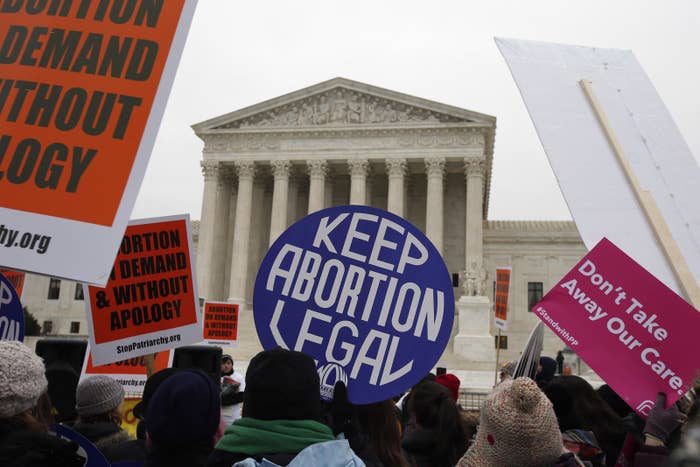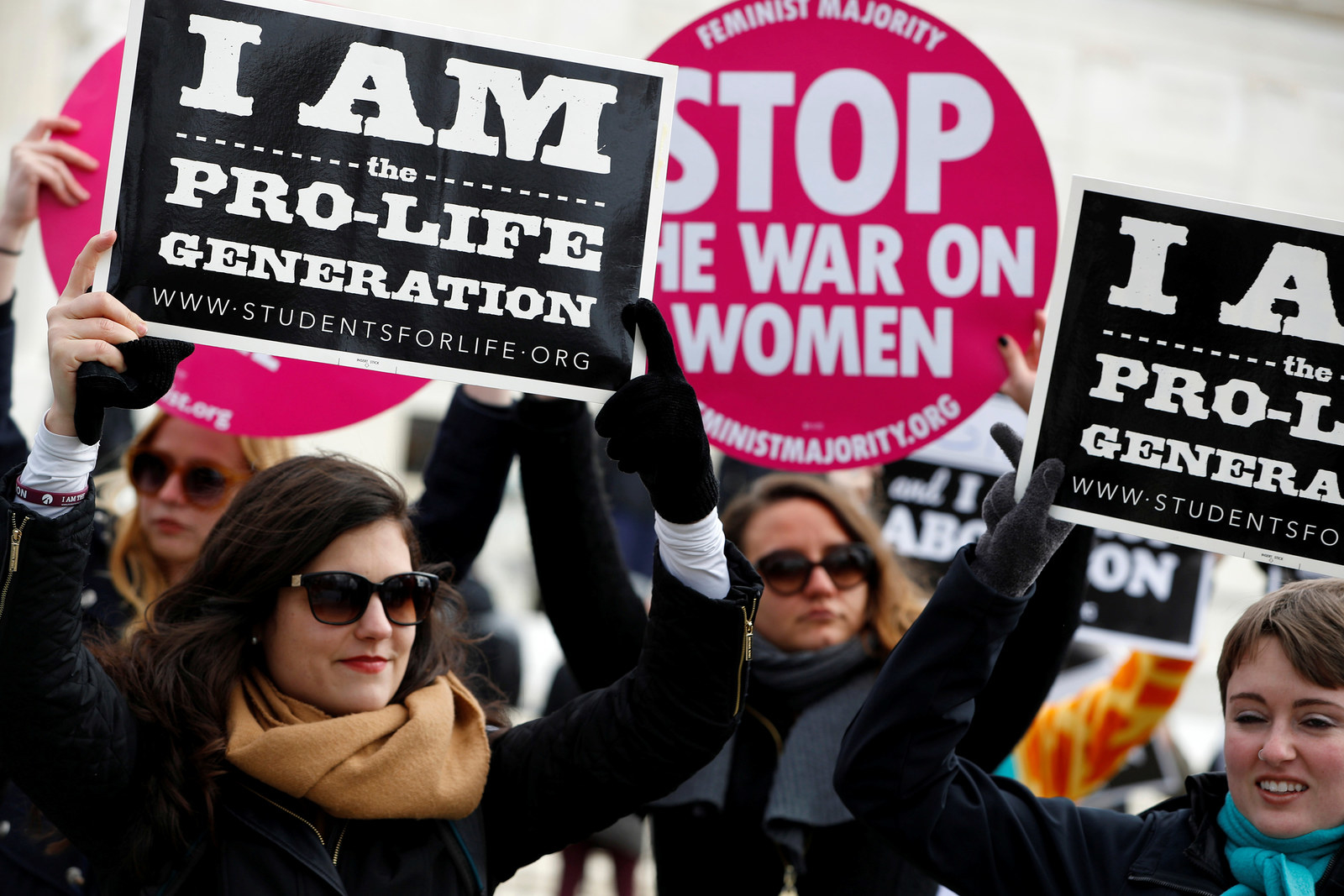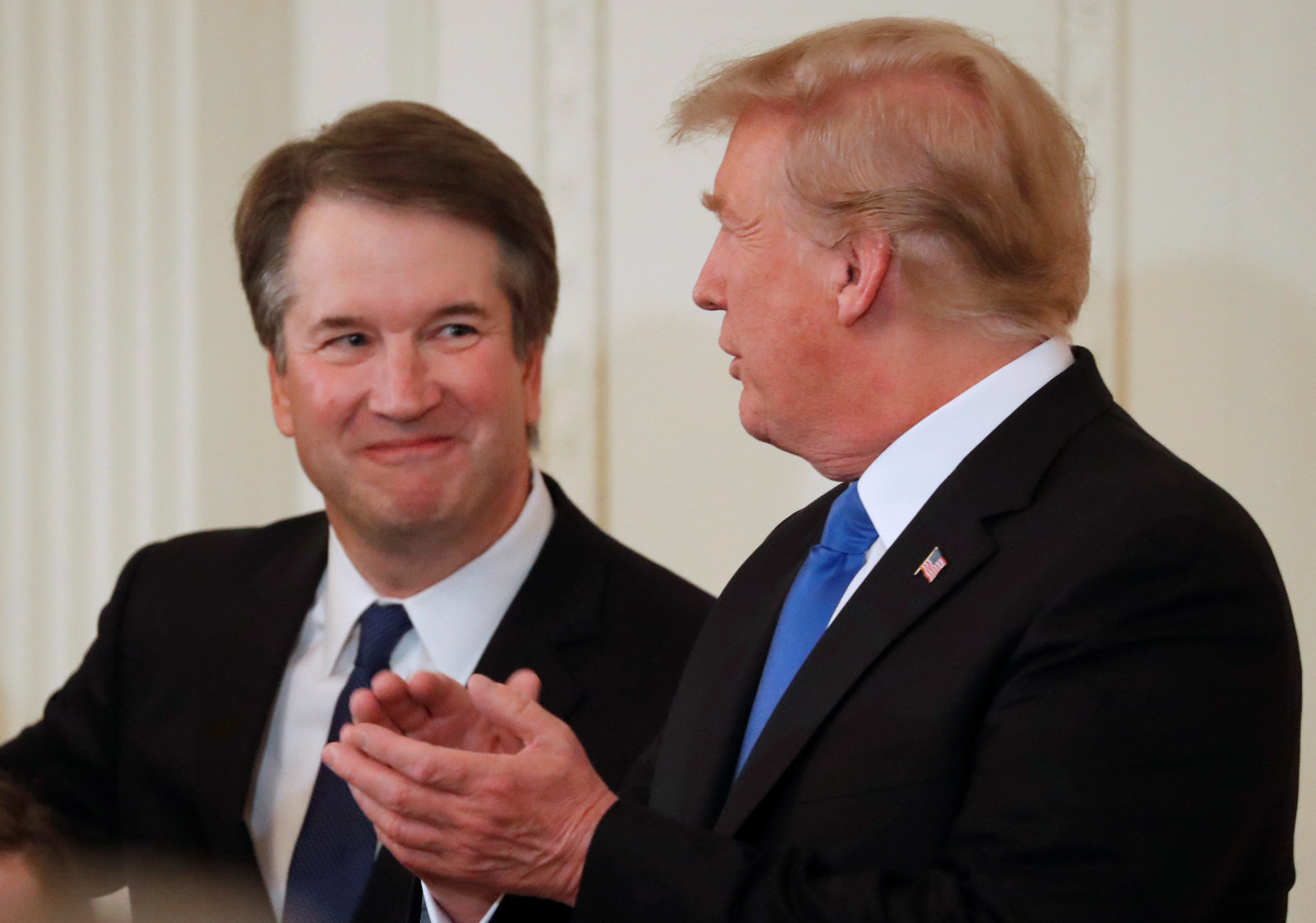
President Donald Trump repeatedly promised during his campaign to nominate Supreme Court justices who would overturn Roe v. Wade. Now with another nominee to the Supreme Court in his hands, abortion rights advocates worry that conservative dream will come true.
But what needs to happen in order for Roe, the 1973 court decision that legalized abortion nationwide, to be overturned is more complex than it might seem. And if it happens, what comes next isn’t black and white either.
Trump nominated Judge Brett Kavanaugh, a George W. Bush–era nominee with an extensive record of conservative decisions. While he has written opinions in past cases expressing anti-abortion sentiments — for example, the late 2017 case Garza v. Hargan in which he wrote that the government had an interest in "favoring fetal life … and refraining from facilitating abortion" — he has carefully avoided expressing a direct opinion on whether he supports or opposes Roe.
Kavanaugh is nominated to replace Justice Anthony Kennedy, a frequent swing vote on the Supreme Court who upheld and reaffirmed Roe v. Wade on several occasions. Many on both sides of the abortion debate saw Kennedy as the one man standing between conservative state legislators and Roe v. Wade, so with him gone, both see the monumental decision as vulnerable.
What needs to happen for Roe v. Wade to be overturned?
First of all, the Senate needs to confirm Kavanaugh. This seems very likely, but Republican Sens. Lisa Murkowski and Susan Collins might be holdouts, as they have voted against the majority of their party on issues related to abortion in the past. However, both voted to confirm Trump’s last pick, Justice Neil Gorsuch, who had the approval of anti-abortion members of Congress and advocates for what they interpreted as his view of the issue.
Then it’s a waiting game for the first lawsuit over abortion rights to reach the Supreme Court.
Since Trump’s election, state legislators have been introducing and passing bold anti-abortion laws that they were well aware would quickly be challenged in court, in the hopes that Trump would have an opportunity to sway the ideological bent of the court.
If Kavanaugh is confirmed, there are a number of cases making their way through the lower courts right now that could end up in the Supreme Court. Then, the Supreme Court has to agree to hear them, which it does not always do.
Even then, Roe’s fate may not rely on Kavanaugh alone.

Chief Justice John Roberts was appointed by former president George W. Bush and remains a staunch conservative. In 1990, before he was a Supreme Court justice, Vox recently noted, Roberts argued that Roe was “wrongly decided and should be overruled.”
However — as BuzzFeed News’ Chris Geidner wrote in January — Roberts has recently seemed to moderate some of his positions, aligning with Kennedy on more than one occasion. He has also emphasized the importance of “promoting stability and evenhandedness” of the Supreme Court, as he put it in his Senate confirmation hearing.
Historically, the Supreme Court has been averse to overturning major precedent, especially precedent that has been around for decades and has been reaffirmed repeatedly by other cases decided by the court. But it’s not unheard of. In June, the court, in a 5–4 split, overturned a 40-year-old decision pertaining to fees charged by unions to nonmembers.
It is likely that the first case they hear on abortion won’t result in a total reversal of Roe, but that a number of their decisions in different cases will trigger a slow and less noticeable destruction of that precedent over time. If Roberts and those to the right of him were to decide repeatedly that state laws greatly restricting abortion access are constitutional, that will chip away at the “undue burden” core of Roe, (meaning laws cannot greatly limit access to abortion) that Kennedy upheld so firmly.
There are currently cases making their ways through the courts that challenge laws requiring several visits to a clinic before getting an abortion, longer waiting periods between those visits, limits on prescribing abortion pills, and limits on how late into the pregnancy an abortion can be performed. Instead of totally reversing Roe, SCOTUS could just deem all these laws constitutional.
One kind of law making its way through the courts that is particularly concerning to abortion rights advocates are laws that ban abortion if it’s for a particular reason, like the gender or sex of the fetus, or if it has a disability.
“Laws like that give the opportunity for some serious chipping,” Amy Myrick, staff attorney for judicial strategies at the Center for Reproductive Rights, told BuzzFeed News.
The Supreme Court could also wait to see, as the cases make their way up through the lower courts, if different appeals courts yield different decisions on similar laws, making it more likely that the justices would see a reason to intervene with a decision.
If they decide to be more dramatic in their decisions after all. The court could, for example, affirm Iowa’s “heartbeat” law, which essentially bans abortion in Iowa by placing a ban on abortion after a month and a half of pregnancy, before many women know they are pregnant. Affirming that law would more or less overturn Roe in the state and any others that follow suit. Alternatively, they could hear that case or a similar one and simply declare Roe wrongly decided.

What happens if Roe v. Wade is overturned?
If Roe is in fact overturned, it would not make abortion illegal throughout the US. Instead, it would throw the decision to the states.
Many states have already shown their cards — Louisiana, Mississippi, North Dakota, and South Dakota have “trigger laws” on the books that would automatically ban abortion if Roe were overturned. According to the pro–abortion rights research center Guttmacher Institute, another 10 states still have unenforced, pre-Roe abortion bans in place. Missouri and Kansas have currently purely symbolic “personhood” laws in place, stating that life begins at conception, and similar legislation was proposed in Alabama.
A total of 17 states currently have laws that could be used to “restrict the legal status of abortion” Guttmacher’s report says, but nine others have laws that would automatically protect abortion rights in cases before viability (meaning, before a fetus could survive outside of the womb) or in the case of a threat to the health of the pregnant woman.
Current laws in states with liberal, pro–abortion rights legislatures, like New York or California, would likely not be affected, though those states may see an increase in out-of-state traffic at their abortion clinics from women whose states ban or limit the procedure.
In states where abortion is outlawed entirely or almost entirely, it seems unlikely that patients seeking illegal abortions would be penalized. There have been very few proposed anti-abortion laws that declare punitive repercussions for the patient; the vast majority of them would punish the doctor with fines or even jail time. While Trump said in an interview during the election that there should be “some form of punishment” for women who have abortions, he quickly took it back, releasing a (now-deleted) statement saying that if abortion were outlawed, the doctor should be held responsible and not the patient as, “the woman is a victim in this case.”

More Than Just Roe
Abortion rights advocates are also concerned that the lack of Supreme Court protection for abortion laws could also facilitate increased restrictions, including bans on insurance that covers abortion, restrictions on access to the abortion pill, the “morning-after pill,” or long-acting contraceptive methods considered by some anti-abortion groups to be “abortifacients,” a claim that many medical groups and professionals say is inaccurate.
“One important thing about Roe v. Wade is that the court located the right to abortion in the liberty clause of the constitution,” Myrick told BuzzFeed News. “They had to take a constitutional interpretation of liberty, so if that is rolled back it could potentially affect other rights as well.”
Most states are not actively passing laws on those subjects just yet, Myrick continued, but with a more conservative Supreme Court, “states might feel emboldened to pass restrictions that they haven’t felt they had [the] ability to in the past, like access to contraception.”
In a press call with reporters Wednesday held by representatives from the National Network of Abortion Funds and National Institute for Reproductive Health, health policy experts discussed a new study showing an increase in people looking online to order and self-administer abortion pills, especially in areas with restrictive abortion laws.
“Having the abortion pill available as an option is game-changing for those who have to … travel long distances to obtain abortions,” Yamani Hernandez, the executive director of the National Network of Abortion Funds, said on the call. Should Roe be overturned or dismantled, she said, it is likely the number of women seeking abortion pills outside of the medical system would increase even more.
However, there are seven states — including New York — that have laws criminalizing “self-administered” abortions, some left on the books from the 1800s. While prosecutions under these laws are very rare, they do still happen. There is currently an advocacy push to overturn these laws, Hernandez said, because as the number of women self-inducing abortion increases, these could be used to penalize women using abortion pills without the guidance of a doctor.
In vitro fertilization could also be threatened in the future, abortion rights advocates and politicians warn. Democratic Sen. Tammy Duckworth — who recently gave birth to a daughter conceived via in vitro fertilization — expressed concern in recent interviews and press conferences that the overturning of Roe could lead to laws restricting access to that method of fertility treatment.
Some major anti-abortion groups, like the Family Research Council or Charlotte Lozier Institute, the research arm of the major anti-abortion advocacy and lobbying organization Susan B. Anthony List, believe that destroying the remaining embryos not used in in vitro is akin to abortion.
No matter the path that is taken, it is extremely unlikely the US will wake up one morning with its abortion laws entirely reversed, which is what Roe did in the opposite direction. It will take time for many states to enact these new laws.

